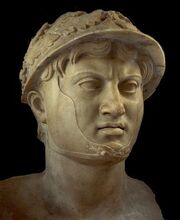
Statue of Pyrrhus
Pyrrhus of Epirus (319-272 BC) was King of Epirus from 307 to 302 BC, and again from 297 to 272 BC, King of Macedon in 288-285 BC and then from 274-272 BC, and King of Sicily from 278 to 275 BC. Pyrrhus was most famed for his victories at the Battle of Heraclea, Battle of Asculum, and at the Battle of Beneventum in the Pyrrhic War, but won at such a cost that he could not carry on with his plans and eventually retreated to Greece, where he was killed in a civil revolt in Argos.
Biography

Pyrrhus at the Siege of Sparta
Pyrrhus of Epirus was a Greek military adventurer who fought for wealth and power in the unstable Mediterranean world of post-Alexander era. As a young man, he took part in the struggles between Alexander's successors - the Macedon Antigonids and the Ptolemies of Egypt - switching sides as it suited his interests. His campaigns in Greece, where he was established as king of the small state of Epirus, created a reputation that traveled far.
In 281 BC Tarentum, a Greek city in southern Italy, asked Pyrrhus to help defend it against the Romans, whose expansionist republic was threatening the independence of all the region's cities. Pyrrhus, who would have barely heard of Rome, doubtless sensed an opportunity for easy victories and personal conquest. He arrived in Tarentum in 280 BC with 25,000 men and 20 elephants - these animals already commonplace in battles farther east, but previously unknown in Italy. At first, the strength of his cavalry and the shock effect of his elephants gave him a comfortable win over the Romans at nearby Heraclea. But the following year, at Asculum, he was victorious only at the expense of huge losses. This is the battle that gave rise to the term "Pyrrhic victory".
At this point, Pyrrhus was distracted with the struggle with Rome by a new invitation, to aid the Greek cities of Sicily against the Carthaginians. He campaigned on the island for three years and had himself proclaimed King of Sicily, but failed to reduce the most stoutly defended Carthaginian strongholds and alienated local Greeks through dictatorial policies. In 275 BC, he returned to southern Italy for yet another round against Rome. At Beneventum, fighting an enemy that was no longer shocked by elephants, the most he could claim was a draw. Short of money and troops, Pyrrhus returned to Greece, where he seized the throne of Macedon. However, his campaigns were brought to an abrupt end during street fighting in the city of Argos. An old woman threw a tile down on his head from a rooftop and a soldier severed his unconscious head from his shoulders.
